How Zebra Katz Earned His Stripes
“I’m not just this one trick pony, you know?” says Ojay Morgan, “I’m a Zebra.” On his debut album Less Is Moor, released last Friday, the Jamaican-American artist, better known by his persona Zebra Katz, boldly reasserts this claim across fifteen, club-ready tracks. He snarls, teases, and throws shade, intentionally showing off all the verve and rhythmic elasticity of his voice on top of minor key beats and rapid drum ‘n bass by producers such as Sega Bodega, Shygirl, and S Ruston. One second, like on ‘Blush,’ he’s all demonic seduction, and, in the next, like on ‘Necklace,’ he’s crooning a flickering lament.
Morgan’s commanding vocals, of course, in all of its raw and reckless configurations, is where it all started. Back in 2012, he launched his career with the outré single ‘Ima Read,’ a song that ended up on repeat at that year’s Rick Owens F/W womenswear collection, becoming the soundtrack du jour of Paris Fashion Week, was picked up by Diplo’s Mad Decent label, and eventually ricocheted onto dance floors around the world. With his whip of tongue-in-cheek lyrics, “Ima take that bitch to college/ Ima give that bitch some knowledge,” Morgan solidified himself in the fashion and club canon simultaneously. Last year, NAAFI’s Lao illustrated the track’s stubborn staying power when he flipped an edit during his Boiler Room Shenzhen set.
Since then, Morgan has released a handful of singles, toured with the Gorillaz, and became even closer friends with Rick Owens and his wife and muse Michele Lamy. (He tells me he partially dedicated Less Is Moor to the two, and hand-delivered a copy of the album to them the last time he was in Paris.)
After an eight-year incubation period, Zebra Katz returns with a full-length statement that borrows some of its unflinching strength from style influences like Grace Jones, continues to give deference to his club culture roots, and razzle-dazzles in his glitzy album iconography–just like the animal from where he got his name. His music now, as it were, still celebrates its original stomping grounds and sounds most comfortable trotting down a runway, side-eyeing all the competition, and then fleeing immediately to the afterparty. He captures this narrative best on single ‘IN IN IN’ when he says, “Yo, what it do, it’s a real GQ interview / On the runway waiting for the shoot / Glam squad, got me looking hella cute,” and then growls on ‘Zad Drums,’ “I got so fucking high last night, I kicked myself out of Berghain.”
In his Sound and Style interview, Zebra Katz shares the brash and, at times, contradictory aesthetics of his irreverent universe.
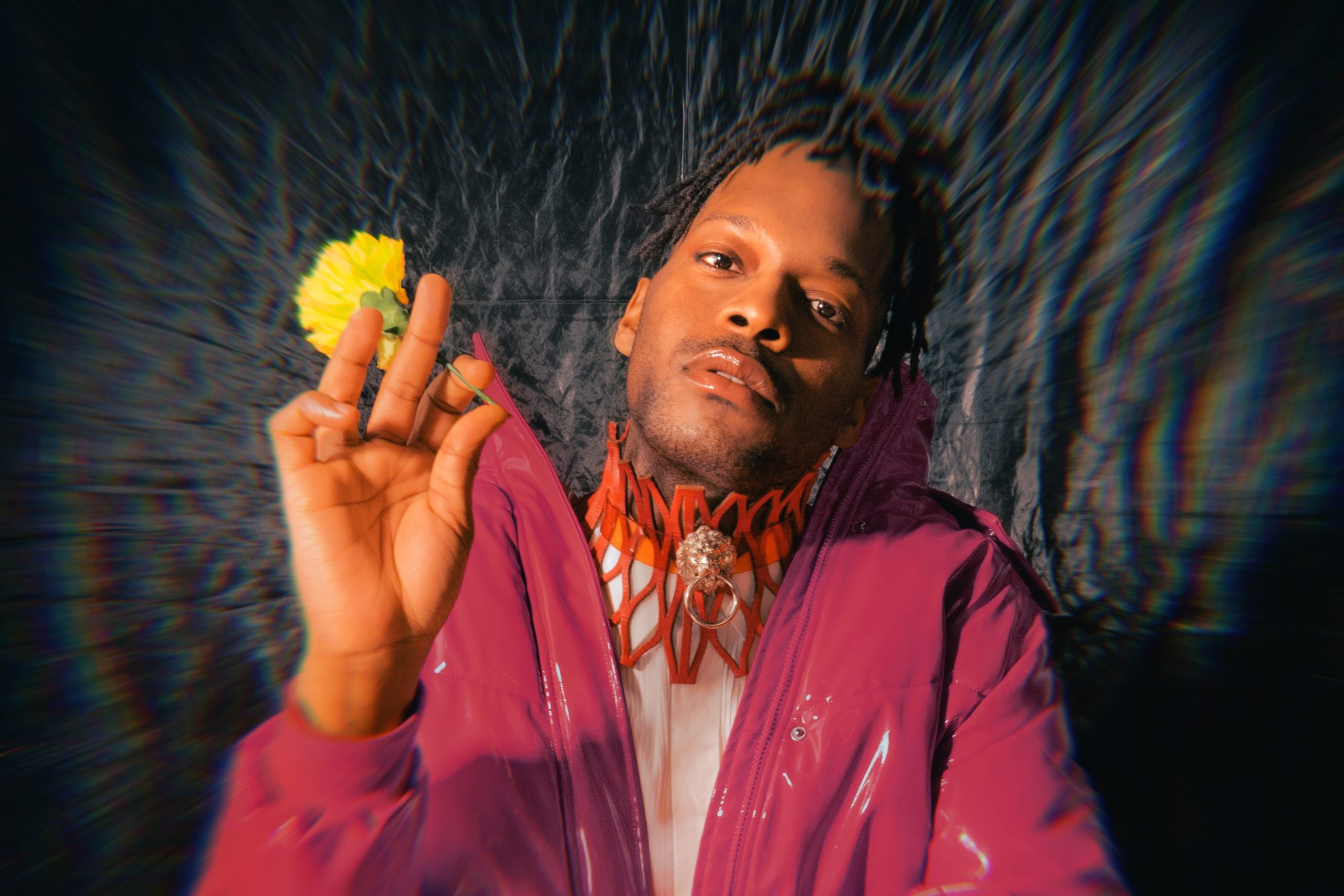
You mentioned that Grace Jones was one of the influences for Less Is Moor. Growing up, were there other figures you looked towards in developing your persona?
I think there were a lot of figures that influenced me growing up. I’m definitely a child of MTV, VH1, and ‘The Making of the Bands’ and pop culture at its greatest. Those were the days when I had people like Missy Elliott as a style icon to look up to, and people like Busta Rhymes as a character and a larger than life figure, and someone that was just an entity on their own.
Even now, I look at people like Little Richard who’s such a strong, influential character in ways that I didn’t even really know. It didn’t hit me until the last two years when I was just doing research, suddenly looking at an influential character who was so ahead of his time in the ’70s, a time where we didn’t even have the language to explain Black otherness. And not just queerness in particular, but for someone who was punk, and someone who was very flamboyant, and someone who was censored, and someone who was whitewashed, and someone who was used as a figure to put someone like Elvis on, and help create the icon that is someone they say “created rock and roll”. And it wasn’t Elvis, it was Richard.
He also put Chuck Berry on, and he put the Beatles on, and he put Jimi Hendrix on, and you got to see this iconic figure do so much for music and still get no credit for it, and he’s actually still a living legend. It’s just really interesting to see how time, not much has changed, but yeah, it’s just something for me to be mindful of, I mean, especially when it comes to what it is I expect from other people when it comes to releasing your music or sharing something that’s so vulnerable and personal.
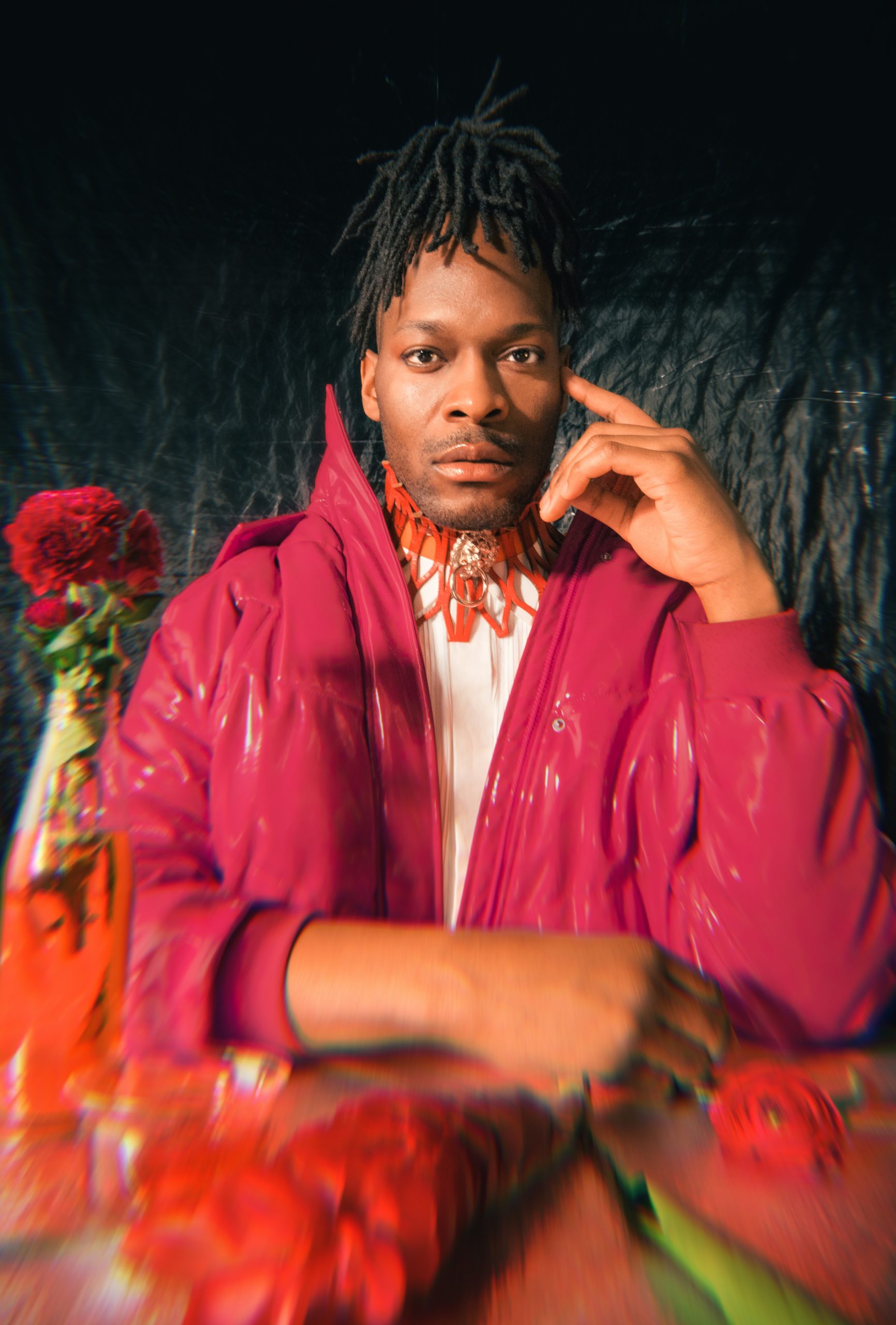
Considering these larger than life characters you looked up to, let’s talk about the opulence on the album cover. What was the visual concept behind it?
A zebra’s main defense mechanism is to disorient their prey with dazzle camo, and I wanted the cover to have this disorienting effect where you couldn’t really tell that things are moving or if there was a play on it, and then playing on the idea of ‘less is more’. There was less of a fuller image, so it’s really zoomed in. There was also jewelry decadence because I think it’s playing on these monolithic Black rap characters that you usually see that are like, “Oh, I have the money. I have the car, and I have the whip, and I got the jewels, and I’m iced out.”
It’s very much a level of facade for me. You know what I mean? It’s very much this dazzle thing. It also is like it appeals to the eyes. But there’s also this song ‘Necklace,’ which is like the complete opposite, and then I’m just saying, “There ain’t no diamonds on my necklace.” You know what I mean? Like I’m not portraying that lifestyle. So it’s another play on just contradiction, in what these characters are and what Zebra Katz can’t and can be. And I think so much of my career was based off what I could or couldn’t be, or where I could succeed and where I couldn’t, and what music I was-
Did people tell you that?
It was always projected on me, what I could and couldn’t do. It’s always been projected on me. My sexuality has always been projected on me, and so has my race. So those are given when it comes to how I do things. I think my art is how I’ve managed to make people think differently and how do I change people’s ideas, and how do I fuck up a concept of being a genre non-conformist. Or being like, “Well, you’d think that I’m just this genre, but I’m actually doing something that melds all of these together in a way that makes it thoughtful and provoking–for me at least.” And if you can’t see those things, I hope to take you on a journey where you can.
Considering the experimental electronic producers like Sega Bodega and Shygirl who you’ve teamed up with on your debut, would you say that club culture has also had a heavy impact on how you grew into Zebra Katz?
Yeah, I probably came up with the character idea for Zebra Katz when I was emceeing at this club in New York called Happy Endings, and I was throwing a party called Popping Bottles, Getting Pregnant alongside [Brooklyn-based rap duo] Ninjasonik. I also was a go-go boy. I also worked in promotion. I was very much in the club scene illegally when I was 18, 19, 20 living in New York City, also getting my college degree, but also having to work. I was a part of websites like myopenbar.com. I partied hard, and I went to [nights like] MisShapes and Motherfuckers. Definitely had a strong club knowledge background, and that was definitely something that informs my music.
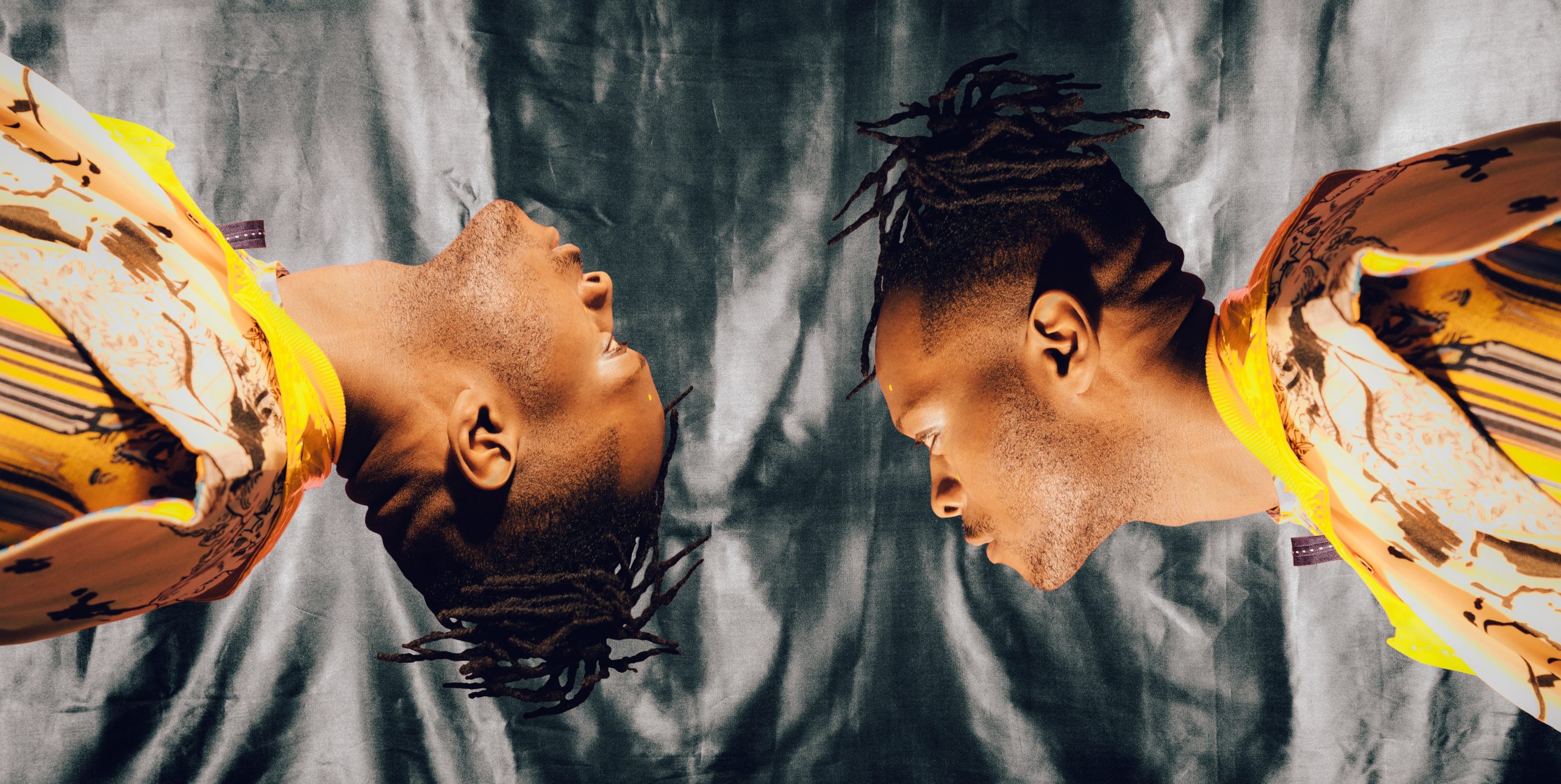
Can you touch upon your early club experiences and how you got into this scene?
It was just my friends, my peer group. I had a class [at The New School’s Eugene Lang] with [DJ] Louisahhh. We were in freshman writing together. I’ve had classes with Venus X. There were a lot of parties going on in New York at that time. Also I went out in London because I studied Shakespeare in 2009 at the British American Dramatic Academy, and that’s when electro was popping and Peaches was kind of going off. I was very intrigued with nightlife and club culture, but then I just burnt out from it because I was like this is all the same and I’m sick of drinking.
But I’m always fascinated with it. I mean, unfortunately, I even went to Burning Man at some point just because of my morbid curiosity for shit. Like, if they say it’s the best party, I want to fucking find out. Let’s go. I am adventurous in that way. I want to be a great, informed artist who doesn’t feel that I’ve seen it all, done at all, so I’m the best because I know that’s not the truth, and I’m going to continue to grow.
That’s probably why I like to go out so much, and I want to see who’s playing good shit, who’s remixing. Yeah, I love a good time out because I also bust my ass sending e‑mails, doing admin for weeks at a time. So it’s good to let your hair down and go out and be a human being, see what else is out there.
I also think club fashion, especially, is always the most experimental. In the dark, people can really come alive. You can be a bit more risqué. So, in that sense, what is the Zebra Katz aesthetic now? How did it initially begin and how has it shifted over your career?
I mean, it’s constantly evolving. I remember calling it ‘hipster couture chic’ at some point because that’s when American Apparel unfortunately was thriving and hipsters were on the top, and it was about what skinny jeans you were wearing. Were they Levi’s or were they acid wash, were they black… It was very much that simplistic, “Oh, you probably got those from Urban Outfitters.” I didn’t have money like that. I remember when I got my first jacket gifted from Rick Owens, I wore that like three times. I was like, “This is fresh. I can’t take this out,” you know what I mean?
So it’s definitely evolved. I like to keep it dark, but also, am I performing? Is it something I can move in? Am I going to survive? What’s the reveal? I was very much into the idea of masking. I am still into the idea of masking in my performance because it brings it back to the comedy and drama references from my thespian days. It’s a big part of the reveal, which I really like in a live show because I think it’s very difficult for people to get to know who I am. I’m constantly evolving this character in front of my fan base for the last seven years. So I get it. And I think with each visual, with each performance, I think they get to see a little bit more, into this universe that I’m trying to create.
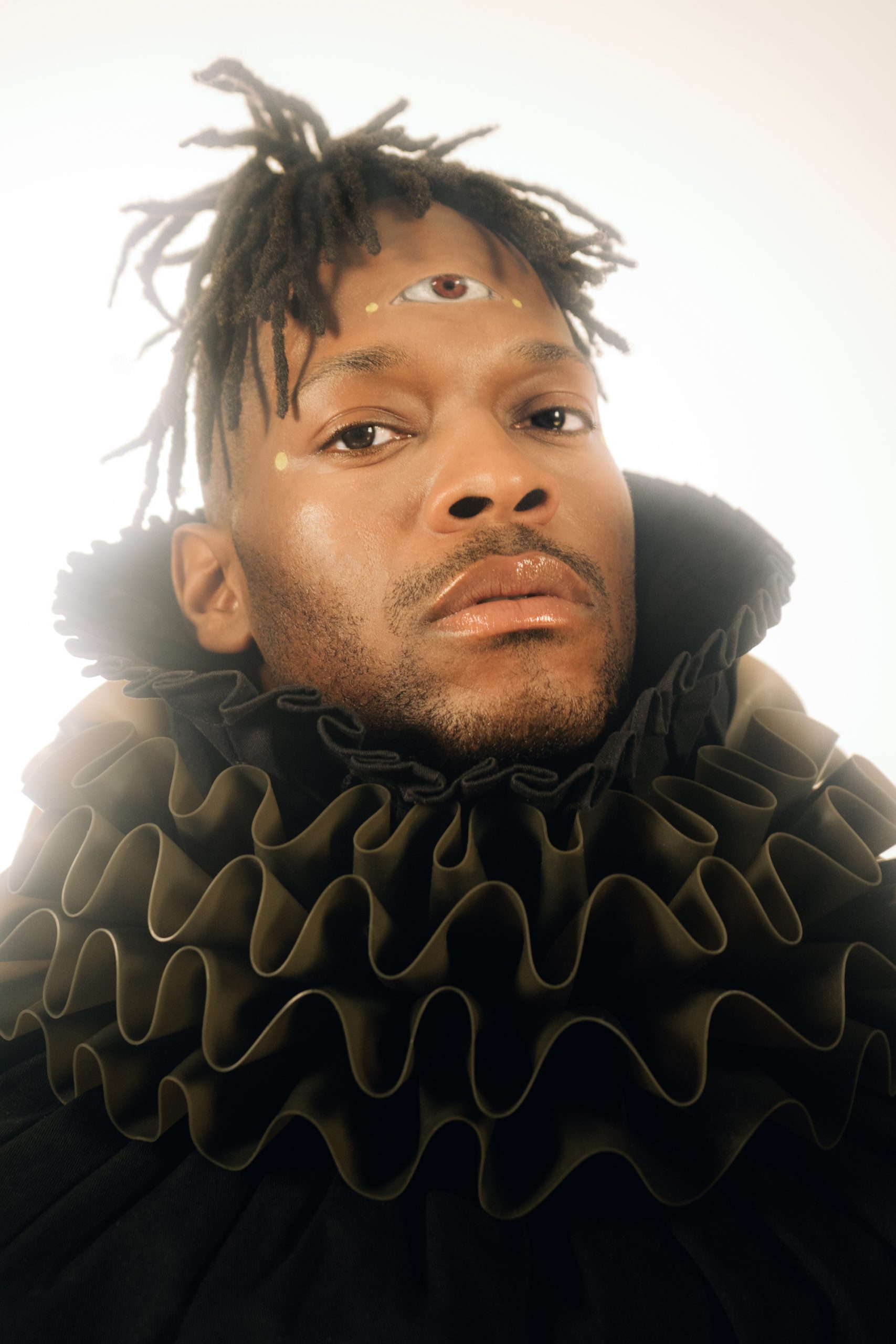
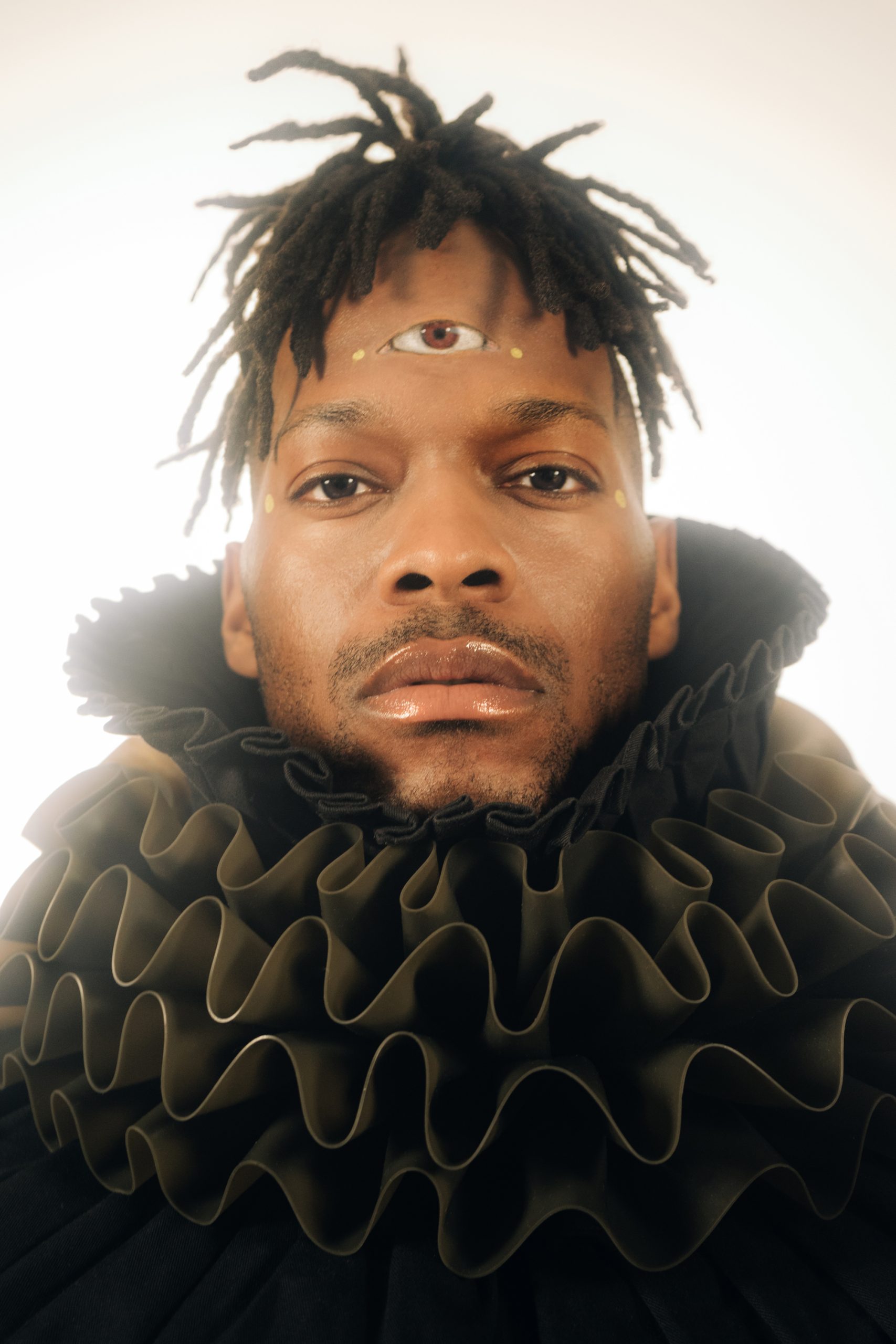
And what is this universe exactly? Or the newest iteration of it, that you’re opening up in this album?
I think James Baldwin always said, “To be a negro in this country is to constantly being enraged.” And that’s definitely about the US. That’s kind of what I’m dancing with on this album. You know what I mean? Similar to what you see in the ‘Ish’ video with me dancing outside of this white box that I was so commonly placed within, and trying to fight against that. This refers back to Lauryn Hill’s ‘I Get Out’ performance on MTV, Unplugged. It’s very much these moments that I resonate with and want to have something to say that I think is very current and needed to say. But I also wanted it to be fun and I wanted you to be able to dance with the oppression.
With your debut, you’re putting the eight years of your personal, musical, and stylistic growth on display here. Ideally, what should listeners take away from it?
It’s broad, but I don’t think it’s just the Black American experience. I think it’s a Black experience and it’s because it’s through my lens. I don’t think you have to necessarily be Black or white or any race in order to feel what I’m dealing with, or going through, or trying to express with this album. But it definitely is a capsule of how I see the world right now and how I am reflecting it, and how I see it in my eyes.
Yeah, it’s a journey, a testament to just perseverance and to believing in your gut and creating your own goddamn work and seeing where it gets you. Look where it got me. And I’d teach any kid and any kid, especially, that looks anything like me or was in any situation similar, that you can get to where you need to go if you trust in your own work, and promote yourself, and work fucking hard. And it’s going to be hard work and people are going to tell you to your face how difficult it is, and people have told me time and time again. Early in my career, I was only celebrated for my hardships and never celebrated for my accomplishments. So now, I’m celebrating my goddamn self, and I’m celebrating my work. This is what this is, and I hope people can feel that and hear that, and I hope people resonate with it.
This interview has been edited and condensed for clarity.
Zebra Katz’s Less Is Moor is out now. Buy it on Bandcamp here.
Whitney Wei is the Editor-in-Chief of Electronic Beats. Follow her on Instagram.
Cover look: Hadas Hinkis latex ruffle accessory, The Black Market vintage pleated skirt piece, artist’s own black puffer and chainmail glove
Photography by Eily Thams, lighting by Rhiannon Thayer, styling by Chaz Aracil, set design by Anna Wim, makeup by Rieke Meisai, photo assistance by Aisha Altenhofen, styling assistance by Ixa



